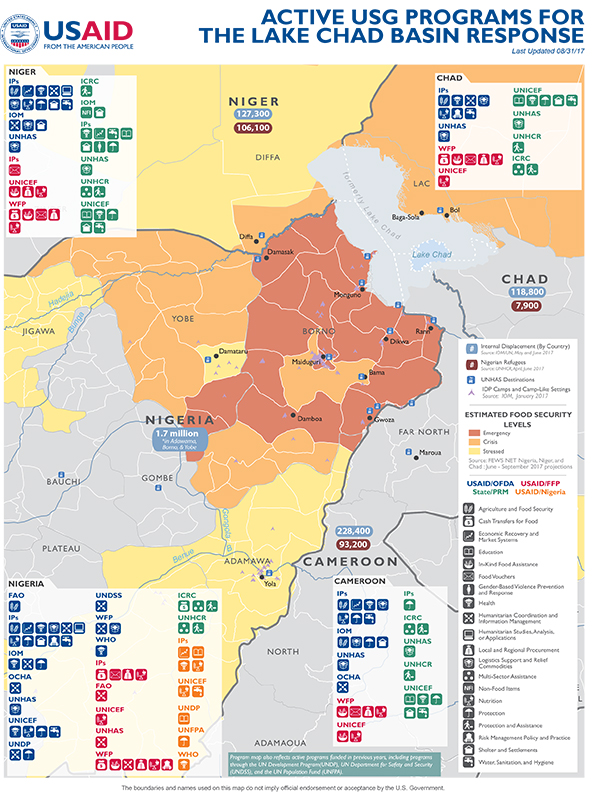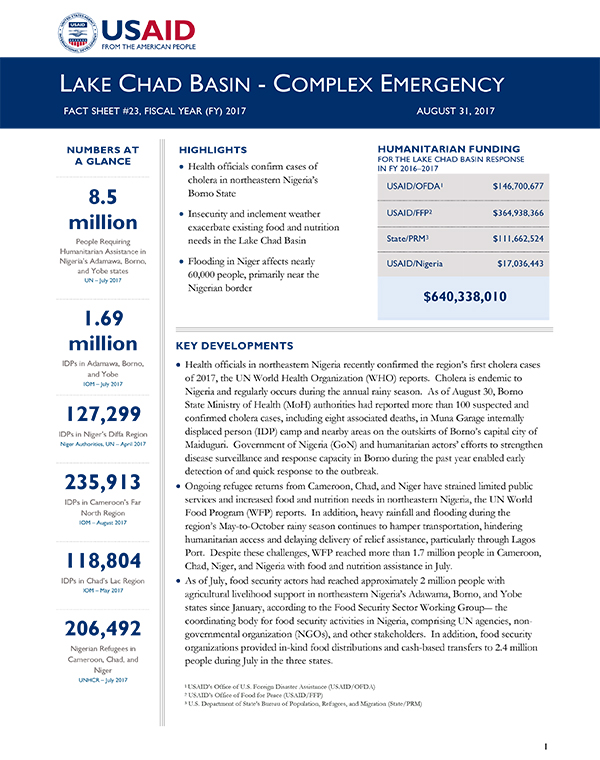- What We Do
- Agriculture and Food Security
- Democracy, Human Rights and Governance
- Economic Growth and Trade
- Education
- Ending Extreme Poverty
- Environment and Global Climate Change
- Gender Equality and Women's Empowerment
- Global Health
- Water and Sanitation
- Working in Crises and Conflict
- Disaster Assistance
- Political Transition Initiatives
- Conflict Mitigation and Prevention
- Countering Violent Extremism
- Disaster Risk Reduction
- Peacebuilding and Reconciliation
- Providing Safe & Secure Environments for Development
- Recovering From Crisis
- Resilience
- Tech Challenge for Atrocity Prevention
- World Humanitarian Day
- U.S. Global Development Lab
August 31, 2017
Highlights
- Health officials confirm cases of cholera in northeastern Nigeria’s Borno State
- Insecurity and inclement weather exacerbate existing food and nutrition needs in the Lake Chad Basin
- Flooding in Niger affects nearly 60,000 people, primarily near the Nigerian border
Lake Chad Map - 08-31-2017 ![]() (pdf - 597k)
(pdf - 597k)
Numbers At A Glance
8.5 million
1.69 million
127,299
235,913
118,804
206,492
Humanitarian Funding
For the Lake Chad Basin Response
| USAID/OFDA | 146,700,677 |
| USAID/FFP | $364,938,366 |
| State/PRM | $111,662,524 |
| USAID Nigeria | $17,036,443 |
| Total | $640,338,010 |
KEY DEVELOPMENTS
Health officials in northeastern Nigeria recently confirmed the region’s first cholera cases of 2017, the UN World Health Organization (WHO) reports. Cholera is endemic to Nigeria and regularly occurs during the annual rainy season. As of August 30, Borno State Ministry of Health (MoH) authorities had reported more than 100 suspected and confirmed cholera cases, including eight associated deaths, in Muna Garage internally displaced person (IDP) camp and nearby areas on the outskirts of Borno’s capital city of Maiduguri. Government of Nigeria (GoN) and humanitarian actors’ efforts to strengthen disease surveillance and response capacity in Borno during the past year enabled early detection of and quick response to the outbreak.
Ongoing refugee returns from Cameroon, Chad, and Niger have strained limited public services and increased food and nutrition needs in northeastern Nigeria, the UN World Food Program (WFP) reports. In addition, heavy rainfall and flooding during the region’s May-to-October rainy season continues to hamper transportation, hindering humanitarian access and delaying delivery of relief assistance, particularly through Lagos Port. Despite these challenges, WFP reached more than 1.7 million people in Cameroon, Chad, Niger, and Nigeria with food and nutrition assistance in July.
As of July, food security actors had reached approximately 2 million people with agricultural livelihood support in northeastern Nigeria’s Adawama, Borno, and Yobe states since January, according to the Food Security Sector Working Group― the coordinating body for food security activities in Nigeria, comprising UN agencies, non-governmental organization (NGOs), and other stakeholders. In addition, food security organizations provided in-kind food distributions and cash-based transfers to 2.4 million people during July in the three states.
NIGERIA
In mid-August, GoN health authorities confirmed the first cholera cases in Borno to occur in 2017. The majority of cases reported to date have occurred at the Muna Garage IDP camp, according to WHO. Borno State MoH authorities had recorded more than 100 suspected and confirmed cholera cases, including eight related deaths, in Muna Garage and nearby areas as of August 30.
The Borno State MoH is coordinating with relief actors, including U.S. Government (USG) partners, on response activities in the state, which include establishing additional cholera treatment centers; evaluating the need for an oral cholera vaccination campaign in the affected area; and increasing messaging on practices to prevent cholera and enable early detection and treatment of the disease.
WHO has prepositioned diarrheal disease kits across Borno and trained nearly 60 health workers—including doctors, laboratory technicians, nurses, and pharmacists—on cholera case management and infection prevention and control. WHO-supported community outreach workers are also conducting operations to identify and refer cholera patients who have yet to seek treatment services at a local health care facility.
The week ending August 14 marked the fourth consecutive week of declining hepatitis E incidence in Borno, with 14 suspected cases identified across 11 local government areas (LGAs)—a nearly 91 percent decrease from the nearly 150 cases reported during the peak of the outbreak in early July, according to health actors. Since the outbreak’s onset in June, Borno health authorities have recorded nearly 820 suspected and confirmed cases of hepatitis E, including five related deaths. The majority of cases are concentrated in Ngala LGA, where health actors have identified nearly 630 suspected and confirmed hepatitis E cases—approximately 77 percent of Borno’s caseload.
In response to the hepatitis E outbreak, USAID/OFDA partners and other relief actors are conducting disease surveillance activities and providing health services at three treatment facilities in Ngala. Additionally, relief actors are distributing hygiene kits, installing latrines and shower blocks, and scaling up hygiene promotion campaigns in host communities and IDP camps to mitigate further spread of the virus. However, health actors note that access challenges—including those related to flooding, heavy rainfall, and security concerns—and a shortage of clinical health care workers are hampering hepatitis E response efforts in some areas.
From August 6–19, a USAID/OFDA partner conducted health consultations for approximately 6,100 people, including more than 1,100 children, in Borno’s Dikwa and Ngala LGAs. In addition to malaria, which remains the primary cause of morbidity in Dikwa, the partner reported a slight increase in the number of patients seeking treatment for traumatic injuries in recent weeks. In late July and early August, nearly 40 patients in Dikwa received treatment for traumatic injuries, caused primarily by person-borne improvised explosive device attacks in the area.
During the same period, community volunteers—who received training from the USAID/OFDA partner—reached more than 2,600 people in Dikwa and Ngala with hygiene promotion messaging. The partner also supported community members to clear drains, desludge latrines, and improve solid waste disposal and management. Additionally, the partner is establishing approximately 90 latrine blocks and more than 30 shower blocks in the two LGAs.
Delivering humanitarian assistance in northeastern Nigeria remains a challenge for USG partners. On August 27, WFP suspended operations at Maiduguri’s Gubio IDP camp after unidentified IDPs began hurling stones at humanitarian workers and NGO vehicles during a monthly distribution of food commodities, damaging five NGO vehicles, international media report. The IDPs were reportedly protesting against the reduction of food rations and distribution of sorghum rather than rice. As of August 30, Nigerian security forces had arrested six suspects in connection with the attack and humanitarian actors suspended camp activities until the safety of humanitarian workers was guaranteed, according to international media.
Congestion at Lagos Port due to heavy rainfall and resultant flooding continues to hinder delivery of internationally procured food commodities, such as specialized nutritious foods for blanket supplementary feeding activities. In response, WFP has coordinated with port authorities to obtain unrestricted access for WFP-contracted trucks, provide additional human resource support to the port, and reroute shipments where possible to alleviate congestion.
The UN Food and Agriculture Organization (FAO) and WFP provided 609,400 smallholder farmers with fertilizer, food rations, seeds, and tools to restore livelihoods and reduce food insecurity and malnutrition in northeastern Nigeria in July.
In July, a USAID/FFP partner screened nearly 3,100 children ages five years and younger for malnutrition in Borno and Yobe and observed a higher incidence of malnutrition in Yobe. The partner distributed electronic vouchers for the purchase of nutrient-rich food to more than 105,000 individuals in the two states and provided counseling on infant and young child feeding practices to caregivers of malnourished children.
CAMEROON
The UN reported numerous security incidents in Cameroon’s Far North Region in August, including three attacks in mid-August in Logone-Et-Chari and Mayo-Tsanaga departments, which resulted in three deaths and seven abductions, injured two people, and destroyed five homes. In addition, suspected Boko Haram militants attacked Gakara village—near Mayo-Sava Department’s Kolofata town—on August 25, resulting in at least 11 civilian deaths. The assailants also reportedly abducted eight people and destroyed approximately 30 houses, according to international media.
According to a recent WFP analysis, food consumption levels in Cameroon have deteriorated following six months of reduced food assistance and the onset of the lean season in July, with more than 14 percent of surveyed households reporting poor food consumption behaviors in June, compared to 9 percent in April. In addition, the Government of Cameroon Ministry of Agriculture is concerned about the country’s recent infestation of fall armyworm, which had spread to six of Cameroon’s 10 regions as of late August. Affected regions include Far North, where host community, IDP, and refugee populations are experiencing insecurity-related food shortages, international media report. In July, WFP provided food assistance to approximately 190,000 host community members, IDPs, and Nigerian refugees in Far North. Additionally, WFP distributed approximately 67 metric tons of food commodities to 6,000 people in vulnerable communities in the region.
Between January and June, a USAID/OFDA NGO partner conducted health consultations for 7,000 children in Mayo-Tsanaga’s Koza town and Logone-Et-Chari’s Makary town and provided health education sessions and training on inpatient care for nearly 2,500 people in Mayo-Tsanaga’s Mokolo city. During the same period, the partner screened nearly 33,600 children in Makary for moderate acute malnutrition and severe acute malnutrition, of whom approximately 1,250 children were diagnosed with acute malnutrition and admitted to a feeding programming. The NGO also disseminated health information on early detection of malnutrition to reach more than 20,000 women in Makary.
CHAD
Uninterrupted food assistance from WFP and other relief actors has significantly improved food consumption scores in Lac Region, according to a recent post-distribution monitoring report from WFP. The proportion of households reporting poor food consumption behaviors decreased from 19 to 1 percent among IDPs and from 24 to 3 percent among Nigerian refugees since the same period in 2016. In July, WFP provided food assistance to 130,000 IDPs and 8,500 Nigerian refugees in Lac, in addition to delivering nutrition services to prevent acute malnutrition for 11,000 children ages 6–23 months.
NIGER
Heavy rainfall and resultant flooding during Niger’s May-to-October rainy season has affected nearly 60,000 people in the country, primarily in Maradi, Niamey, and Zinder regions, according to the UN. Since June, local authorities have recorded more than 40 deaths across Niger due to flooding. In coordination with Government of Niger authorities, the International Organization for Migration (IOM), a local NGO, and the UN Children’s Fund (UNICEF) are providing relief items, including shelter supplies, to affected populations.
In July, WFP reached 158,000 host community members, IDPs, refugees, and returnees in Niger with food assistance and nutritional monitoring services.
CONTEXT
Following escalated violence in northeastern Nigeria, the GoN declared a state of emergency in Adamawa, Borno, and Yobe in May 2013. Between 2013 and 2015, Boko Haram attacks generated significant displacement within Nigeria and eventually to the surrounding countries of Cameroon, Chad, and Niger. As Boko Haram expanded its reach in Nigeria, controlling territory and launching attacks in neighboring countries, the scale of displacement continued to increase, and deteriorations in markets and loss of livelihoods exacerbated conflict-related food insecurity.
By early 2016, advances by the Nigerian military and the Multi-National Joint Task Force—comprising forces from Benin, Cameroon, Chad, Niger, and Nigeria—had recovered large swathes of territory from Boko Haram in Nigeria, revealing acute food insecurity and malnutrition in newly accessible areas. Insecurity, including attacks by Boko Haram and the Islamic State of Iraq and Syria–West Africa, continues to restrict access to basic services, and both displaced people and vulnerable host communities are in need of emergency food assistance, safe drinking water, and relief commodities, as well as health, nutrition, protection, shelter, and water, sanitation, and hygiene (WASH) interventions.
In October and November 2016, U.S. Ambassador Michael S. Hoza, U.S. Ambassador Geeta Pasi, U.S. Ambassador Eunice S. Reddick, and U.S. Chargé d’Affaires, a.i., David J. Young, redeclared disasters for the complex emergencies in Cameroon, Chad, Niger, and Nigeria, respectively.
On November 10, 2016, USAID activated a Disaster Assistance Response Team (DART) to lead the USG response to the humanitarian crisis in northeastern Nigeria.









Comment
Make a general inquiry or suggest an improvement.